Business Law LO 3 Report: Legal Formation and Management of Businesses
VerifiedAdded on 2023/01/23
|12
|897
|86
Report
AI Summary
This report delves into the realm of business law, focusing on the legal formation, management, and funding of various business organizations. It categorizes businesses into three main types: public, private, and voluntary organizations, detailing their distinct characteristics. The report elucidates the legal structures, director requirements, and funding sources specific to each type. Public organizations, funded by the government, are contrasted with private firms that seek profit maximization through diverse funding avenues, including personal savings and angel investors. Voluntary organizations, driven by societal welfare, are explored in terms of their legal structures and funding, often relying on government grants, donations, and national lottery funds. The presentation concludes by summarizing the legal frameworks, management structures, and funding models of these business types, emphasizing their importance for smooth operations.

Business Law
LO 3
LO 3
Paraphrase This Document
Need a fresh take? Get an instant paraphrase of this document with our AI Paraphraser
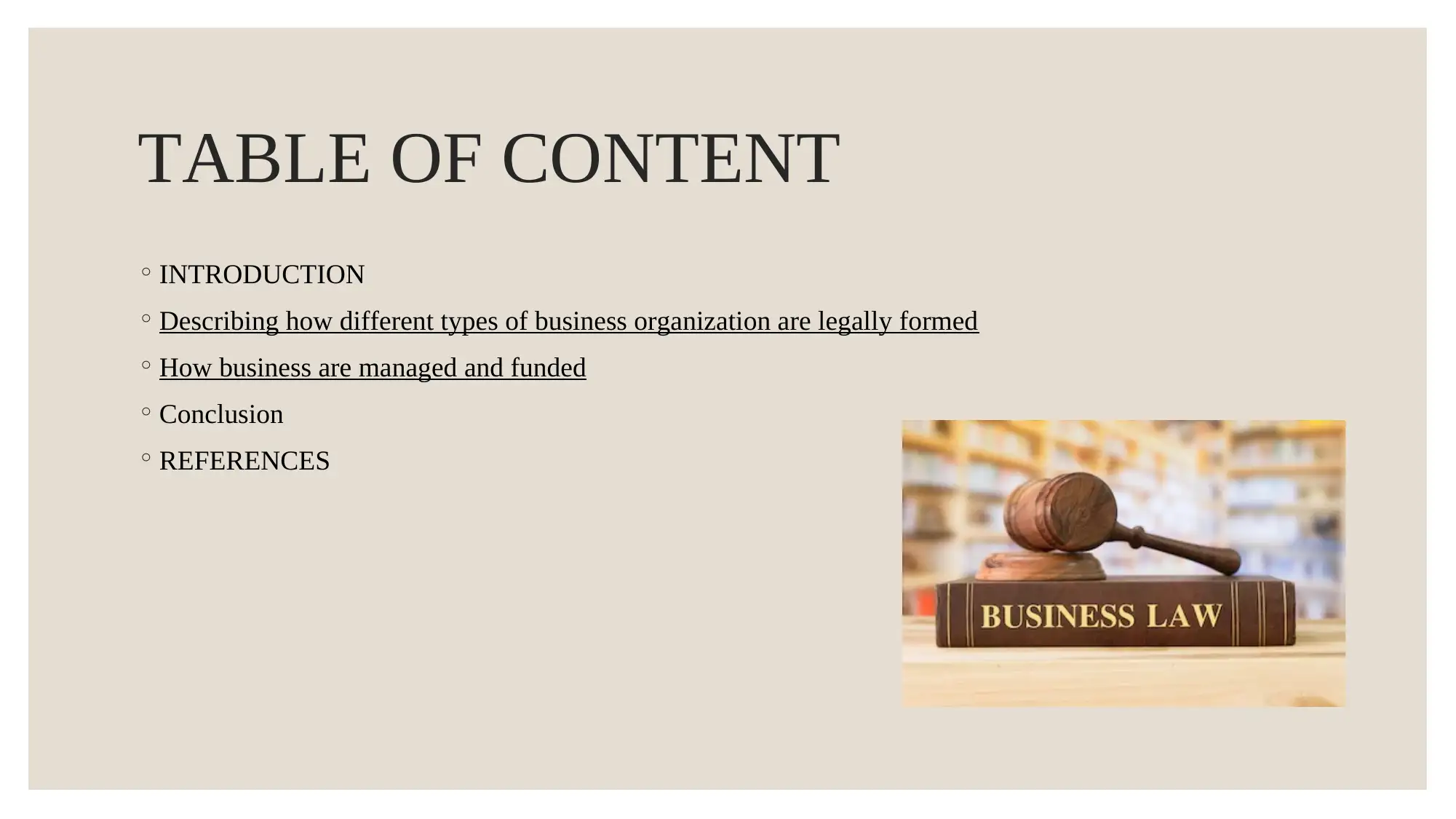
TABLE OF CONTENT
◦ INTRODUCTION
◦ Describing how different types of business organization are legally formed
◦ How business are managed and funded
◦ Conclusion
◦ REFERENCES
◦ INTRODUCTION
◦ Describing how different types of business organization are legally formed
◦ How business are managed and funded
◦ Conclusion
◦ REFERENCES
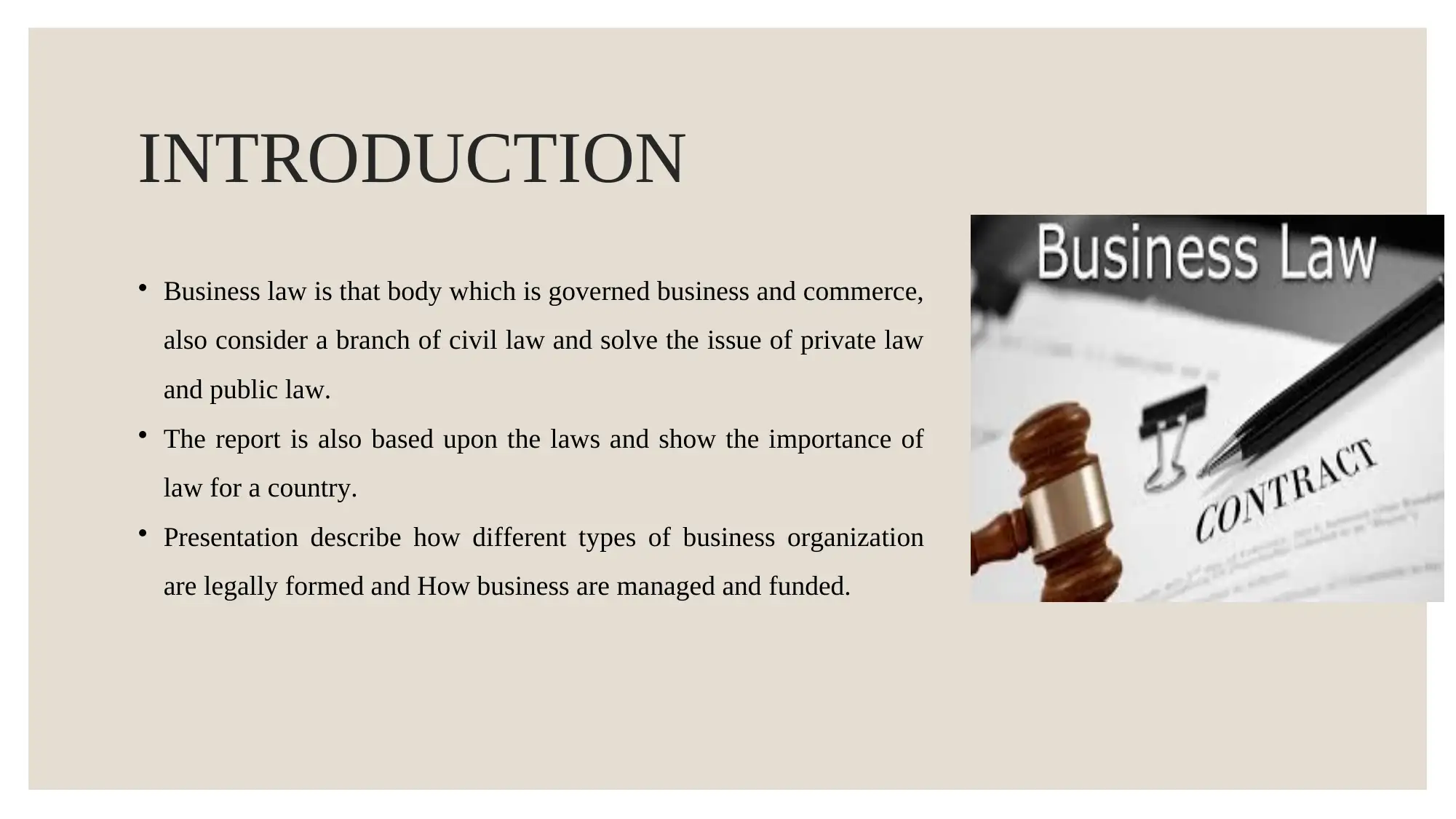
INTRODUCTION
Business law is that body which is governed business and commerce,
also consider a branch of civil law and solve the issue of private law
and public law.
The report is also based upon the laws and show the importance of
law for a country.
Presentation describe how different types of business organization
are legally formed and How business are managed and funded.
Business law is that body which is governed business and commerce,
also consider a branch of civil law and solve the issue of private law
and public law.
The report is also based upon the laws and show the importance of
law for a country.
Presentation describe how different types of business organization
are legally formed and How business are managed and funded.
⊘ This is a preview!⊘
Do you want full access?
Subscribe today to unlock all pages.

Trusted by 1+ million students worldwide
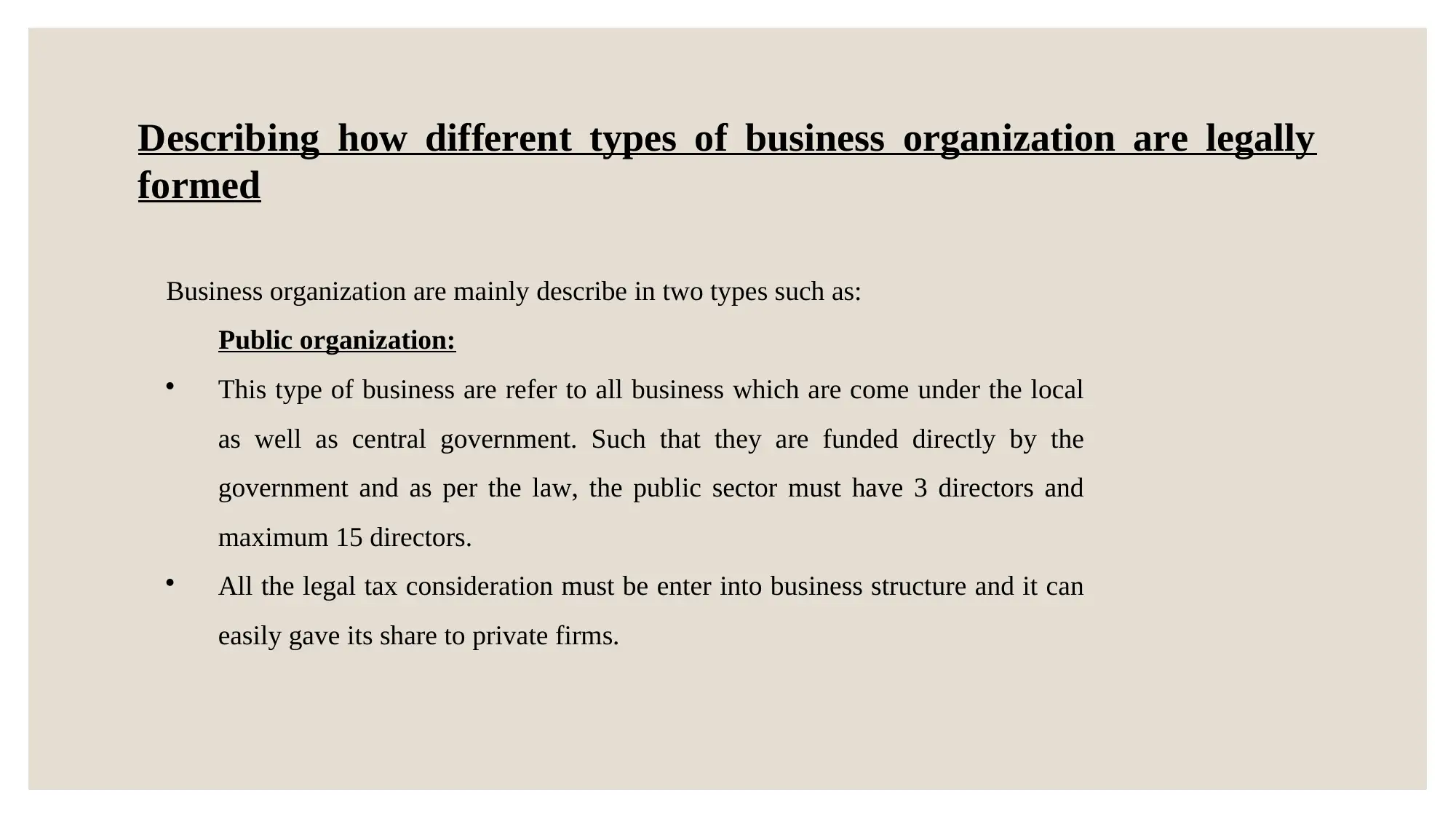
Describing how different types of business organization are legally
formed
Business organization are mainly describe in two types such as:
Public organization:
This type of business are refer to all business which are come under the local
as well as central government. Such that they are funded directly by the
government and as per the law, the public sector must have 3 directors and
maximum 15 directors.
All the legal tax consideration must be enter into business structure and it can
easily gave its share to private firms.
formed
Business organization are mainly describe in two types such as:
Public organization:
This type of business are refer to all business which are come under the local
as well as central government. Such that they are funded directly by the
government and as per the law, the public sector must have 3 directors and
maximum 15 directors.
All the legal tax consideration must be enter into business structure and it can
easily gave its share to private firms.
Paraphrase This Document
Need a fresh take? Get an instant paraphrase of this document with our AI Paraphraser
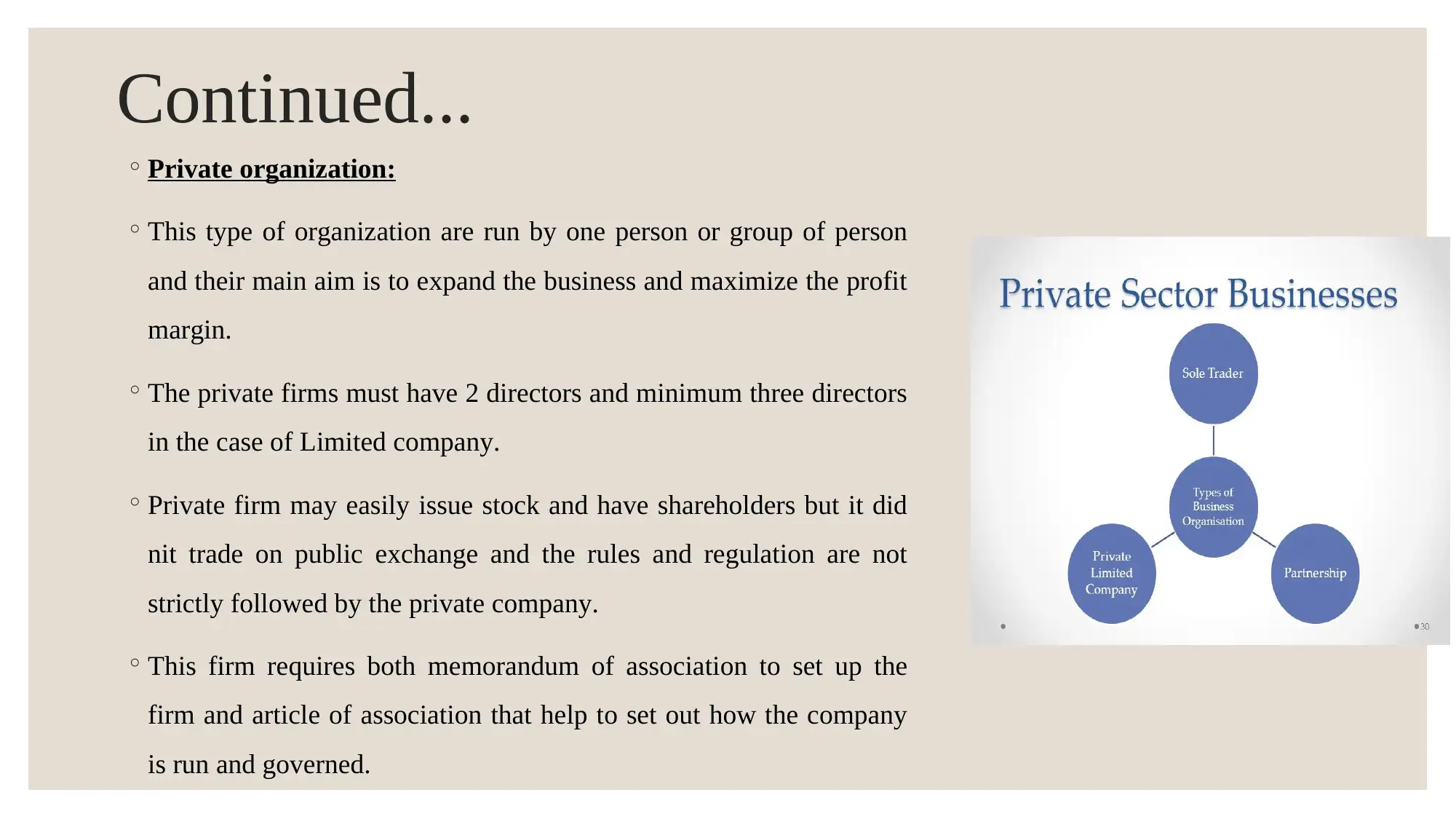
Continued...
◦ Private organization:
◦ This type of organization are run by one person or group of person
and their main aim is to expand the business and maximize the profit
margin.
◦ The private firms must have 2 directors and minimum three directors
in the case of Limited company.
◦ Private firm may easily issue stock and have shareholders but it did
nit trade on public exchange and the rules and regulation are not
strictly followed by the private company.
◦ This firm requires both memorandum of association to set up the
firm and article of association that help to set out how the company
is run and governed.
◦ Private organization:
◦ This type of organization are run by one person or group of person
and their main aim is to expand the business and maximize the profit
margin.
◦ The private firms must have 2 directors and minimum three directors
in the case of Limited company.
◦ Private firm may easily issue stock and have shareholders but it did
nit trade on public exchange and the rules and regulation are not
strictly followed by the private company.
◦ This firm requires both memorandum of association to set up the
firm and article of association that help to set out how the company
is run and governed.
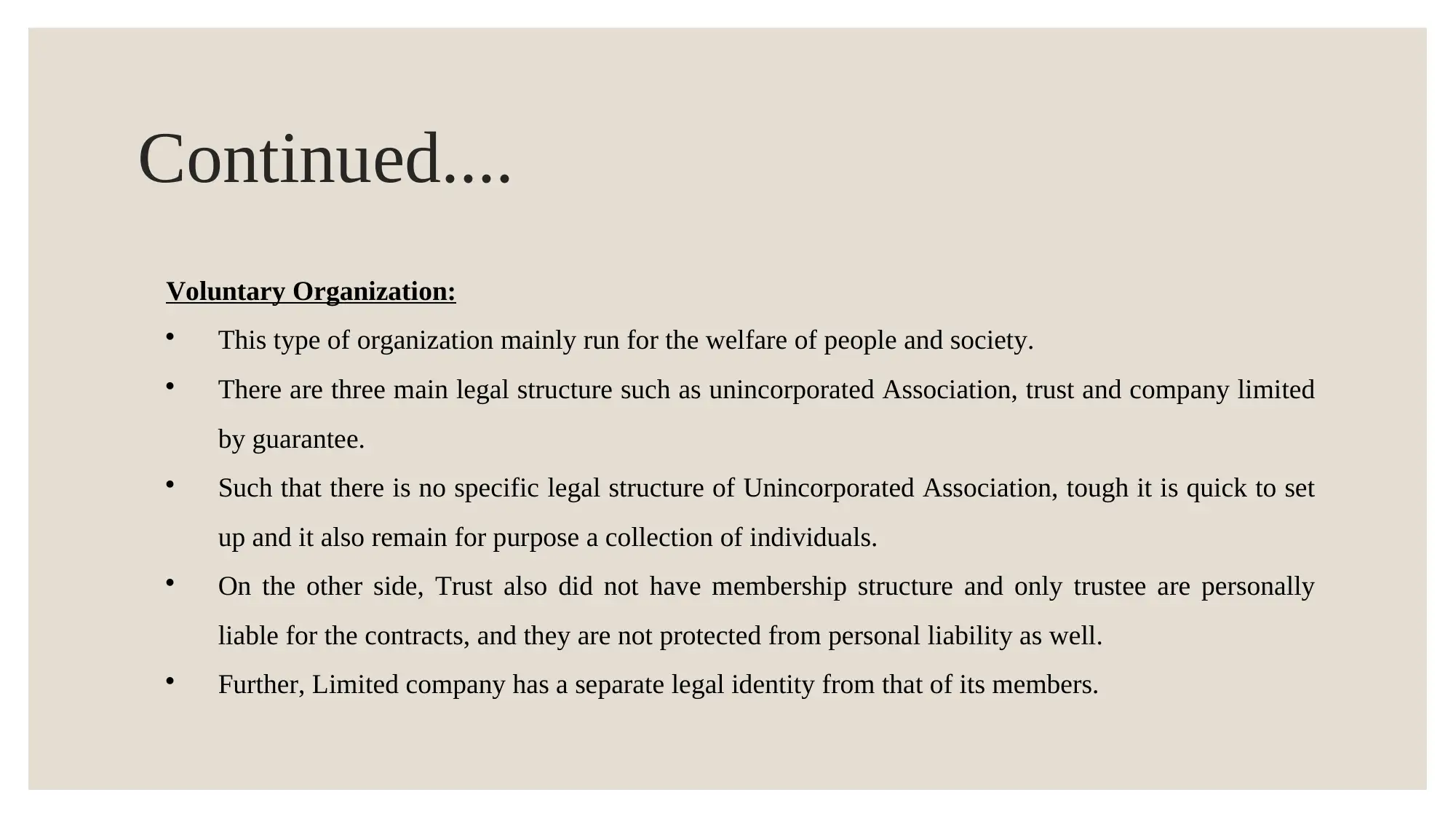
Continued....
Voluntary Organization:
This type of organization mainly run for the welfare of people and society.
There are three main legal structure such as unincorporated Association, trust and company limited
by guarantee.
Such that there is no specific legal structure of Unincorporated Association, tough it is quick to set
up and it also remain for purpose a collection of individuals.
On the other side, Trust also did not have membership structure and only trustee are personally
liable for the contracts, and they are not protected from personal liability as well.
Further, Limited company has a separate legal identity from that of its members.
Voluntary Organization:
This type of organization mainly run for the welfare of people and society.
There are three main legal structure such as unincorporated Association, trust and company limited
by guarantee.
Such that there is no specific legal structure of Unincorporated Association, tough it is quick to set
up and it also remain for purpose a collection of individuals.
On the other side, Trust also did not have membership structure and only trustee are personally
liable for the contracts, and they are not protected from personal liability as well.
Further, Limited company has a separate legal identity from that of its members.
⊘ This is a preview!⊘
Do you want full access?
Subscribe today to unlock all pages.

Trusted by 1+ million students worldwide
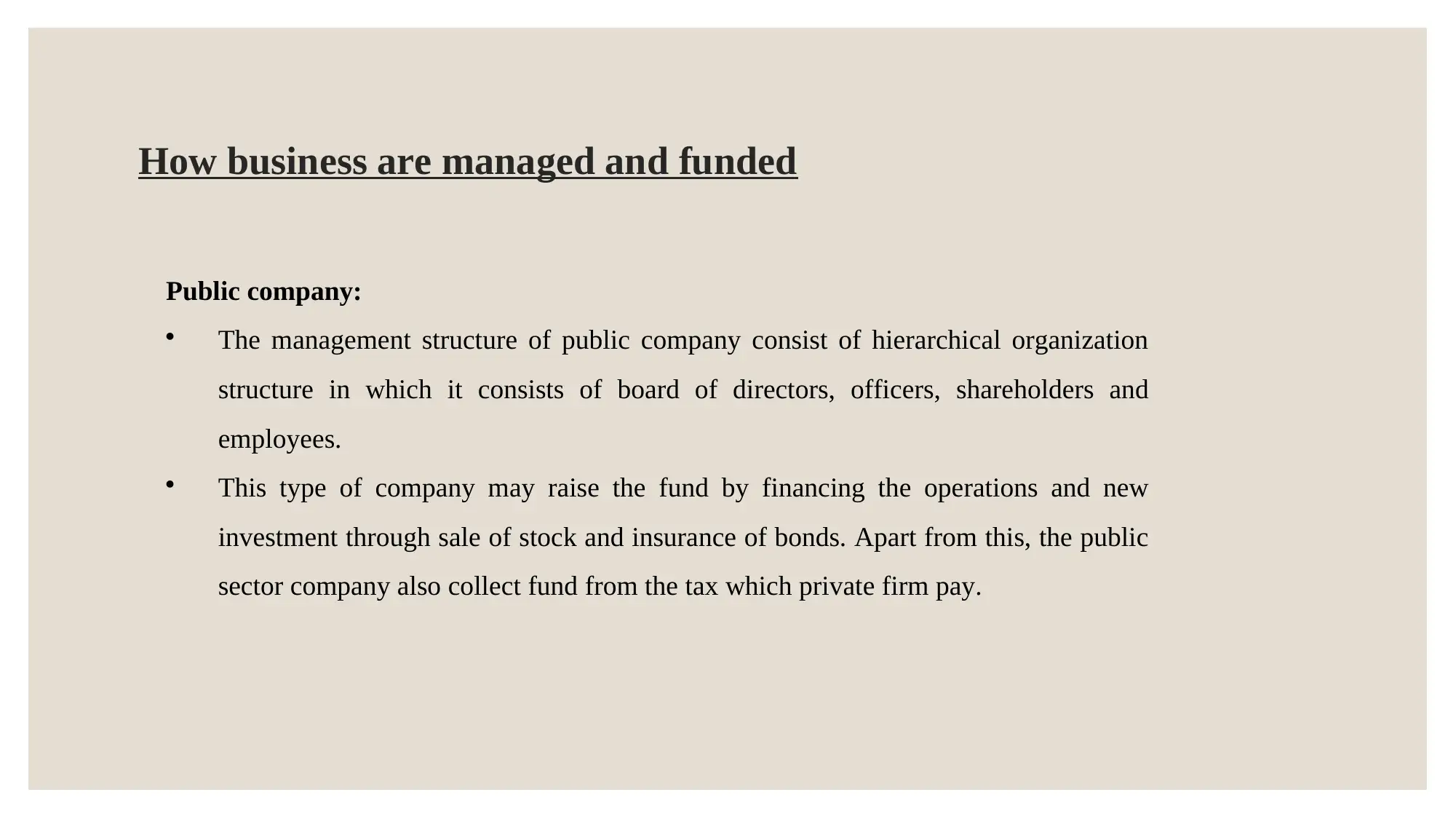
How business are managed and funded
Public company:
The management structure of public company consist of hierarchical organization
structure in which it consists of board of directors, officers, shareholders and
employees.
This type of company may raise the fund by financing the operations and new
investment through sale of stock and insurance of bonds. Apart from this, the public
sector company also collect fund from the tax which private firm pay.
Public company:
The management structure of public company consist of hierarchical organization
structure in which it consists of board of directors, officers, shareholders and
employees.
This type of company may raise the fund by financing the operations and new
investment through sale of stock and insurance of bonds. Apart from this, the public
sector company also collect fund from the tax which private firm pay.
Paraphrase This Document
Need a fresh take? Get an instant paraphrase of this document with our AI Paraphraser
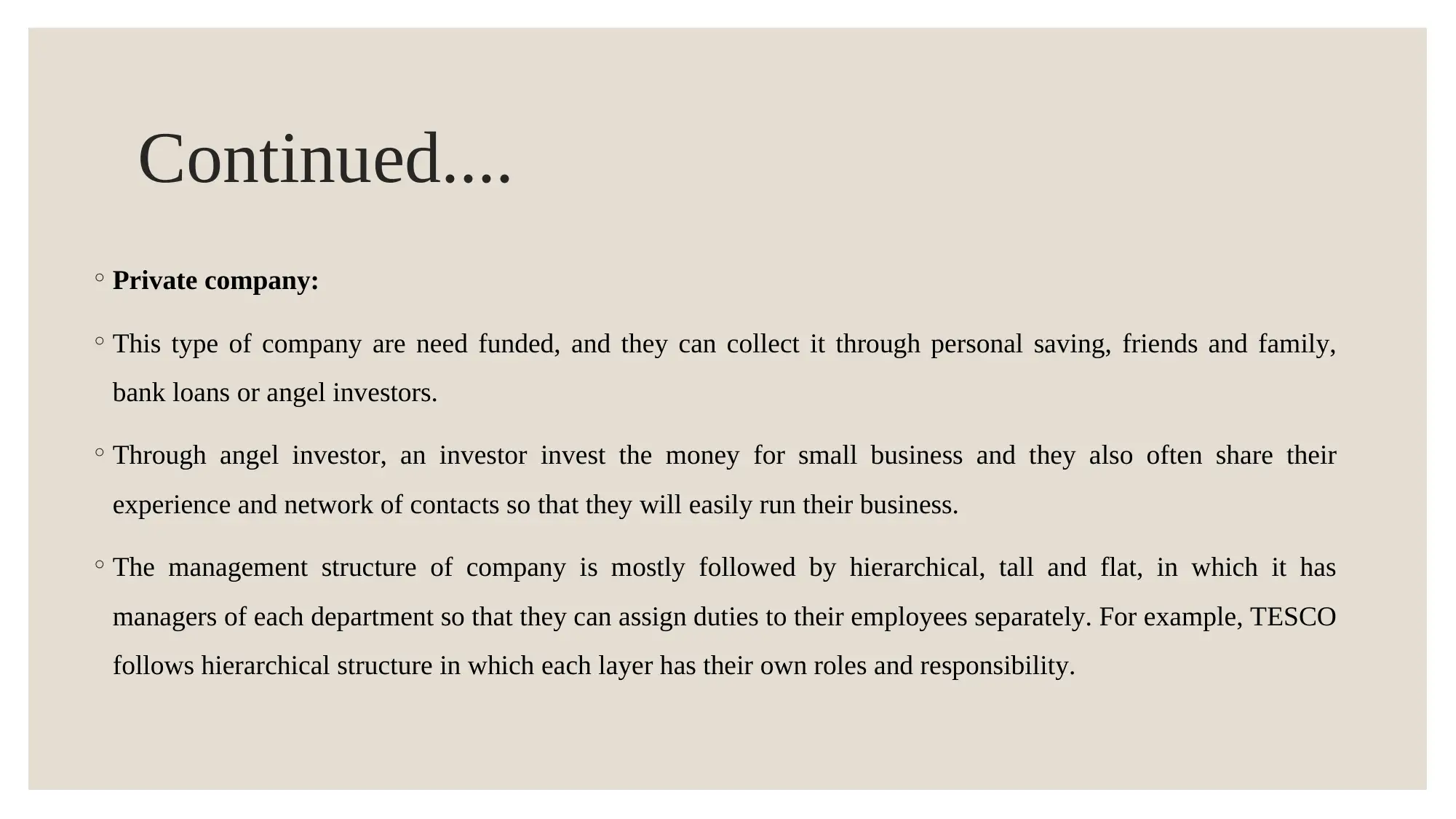
Continued....
◦ Private company:
◦ This type of company are need funded, and they can collect it through personal saving, friends and family,
bank loans or angel investors.
◦ Through angel investor, an investor invest the money for small business and they also often share their
experience and network of contacts so that they will easily run their business.
◦ The management structure of company is mostly followed by hierarchical, tall and flat, in which it has
managers of each department so that they can assign duties to their employees separately. For example, TESCO
follows hierarchical structure in which each layer has their own roles and responsibility.
◦ Private company:
◦ This type of company are need funded, and they can collect it through personal saving, friends and family,
bank loans or angel investors.
◦ Through angel investor, an investor invest the money for small business and they also often share their
experience and network of contacts so that they will easily run their business.
◦ The management structure of company is mostly followed by hierarchical, tall and flat, in which it has
managers of each department so that they can assign duties to their employees separately. For example, TESCO
follows hierarchical structure in which each layer has their own roles and responsibility.
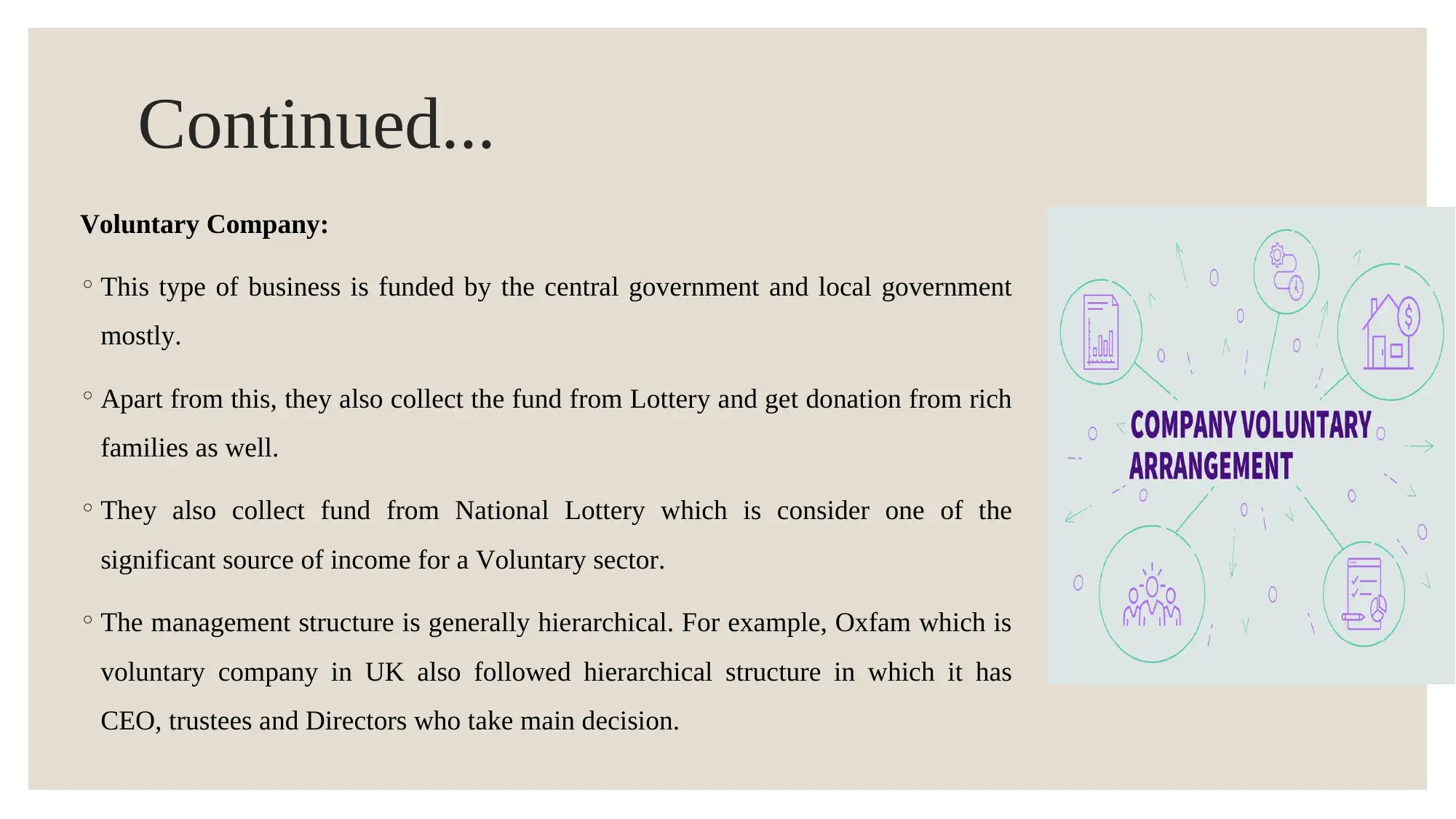
Continued...
Voluntary Company:
◦ This type of business is funded by the central government and local government
mostly.
◦ Apart from this, they also collect the fund from Lottery and get donation from rich
families as well.
◦ They also collect fund from National Lottery which is consider one of the
significant source of income for a Voluntary sector.
◦ The management structure is generally hierarchical. For example, Oxfam which is
voluntary company in UK also followed hierarchical structure in which it has
CEO, trustees and Directors who take main decision.
Voluntary Company:
◦ This type of business is funded by the central government and local government
mostly.
◦ Apart from this, they also collect the fund from Lottery and get donation from rich
families as well.
◦ They also collect fund from National Lottery which is consider one of the
significant source of income for a Voluntary sector.
◦ The management structure is generally hierarchical. For example, Oxfam which is
voluntary company in UK also followed hierarchical structure in which it has
CEO, trustees and Directors who take main decision.
⊘ This is a preview!⊘
Do you want full access?
Subscribe today to unlock all pages.

Trusted by 1+ million students worldwide
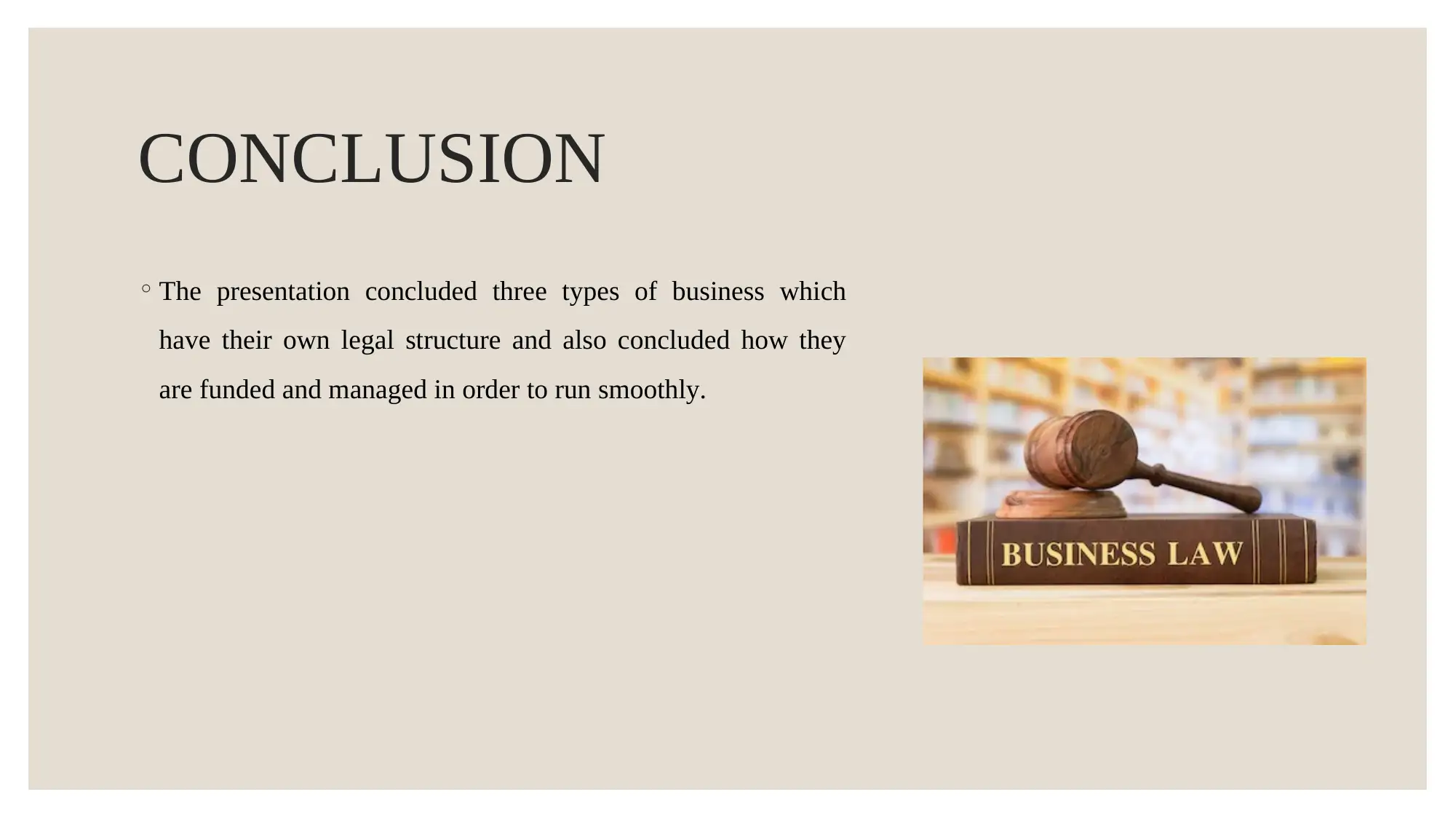
CONCLUSION
◦ The presentation concluded three types of business which
have their own legal structure and also concluded how they
are funded and managed in order to run smoothly.
◦ The presentation concluded three types of business which
have their own legal structure and also concluded how they
are funded and managed in order to run smoothly.
Paraphrase This Document
Need a fresh take? Get an instant paraphrase of this document with our AI Paraphraser
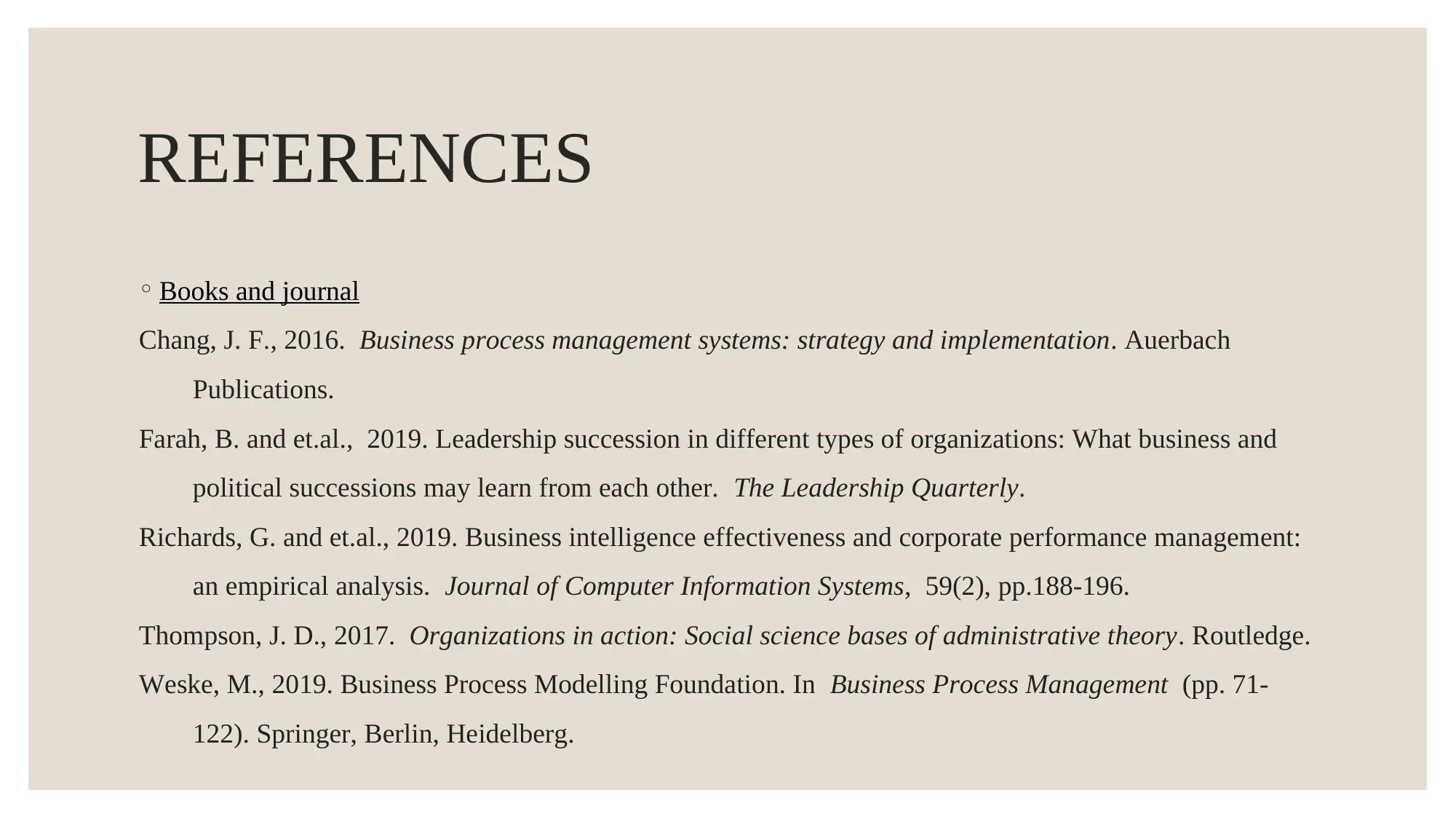
REFERENCES
◦ Books and journal
Chang, J. F., 2016. Business process management systems: strategy and implementation. Auerbach
Publications.
Farah, B. and et.al., 2019. Leadership succession in different types of organizations: What business and
political successions may learn from each other. The Leadership Quarterly.
Richards, G. and et.al., 2019. Business intelligence effectiveness and corporate performance management:
an empirical analysis. Journal of Computer Information Systems, 59(2), pp.188-196.
Thompson, J. D., 2017. Organizations in action: Social science bases of administrative theory. Routledge.
Weske, M., 2019. Business Process Modelling Foundation. In Business Process Management (pp. 71-
122). Springer, Berlin, Heidelberg.
◦ Books and journal
Chang, J. F., 2016. Business process management systems: strategy and implementation. Auerbach
Publications.
Farah, B. and et.al., 2019. Leadership succession in different types of organizations: What business and
political successions may learn from each other. The Leadership Quarterly.
Richards, G. and et.al., 2019. Business intelligence effectiveness and corporate performance management:
an empirical analysis. Journal of Computer Information Systems, 59(2), pp.188-196.
Thompson, J. D., 2017. Organizations in action: Social science bases of administrative theory. Routledge.
Weske, M., 2019. Business Process Modelling Foundation. In Business Process Management (pp. 71-
122). Springer, Berlin, Heidelberg.

⊘ This is a preview!⊘
Do you want full access?
Subscribe today to unlock all pages.

Trusted by 1+ million students worldwide
1 out of 12
Related Documents
Your All-in-One AI-Powered Toolkit for Academic Success.
+13062052269
info@desklib.com
Available 24*7 on WhatsApp / Email
![[object Object]](/_next/static/media/star-bottom.7253800d.svg)
Unlock your academic potential
Copyright © 2020–2026 A2Z Services. All Rights Reserved. Developed and managed by ZUCOL.




